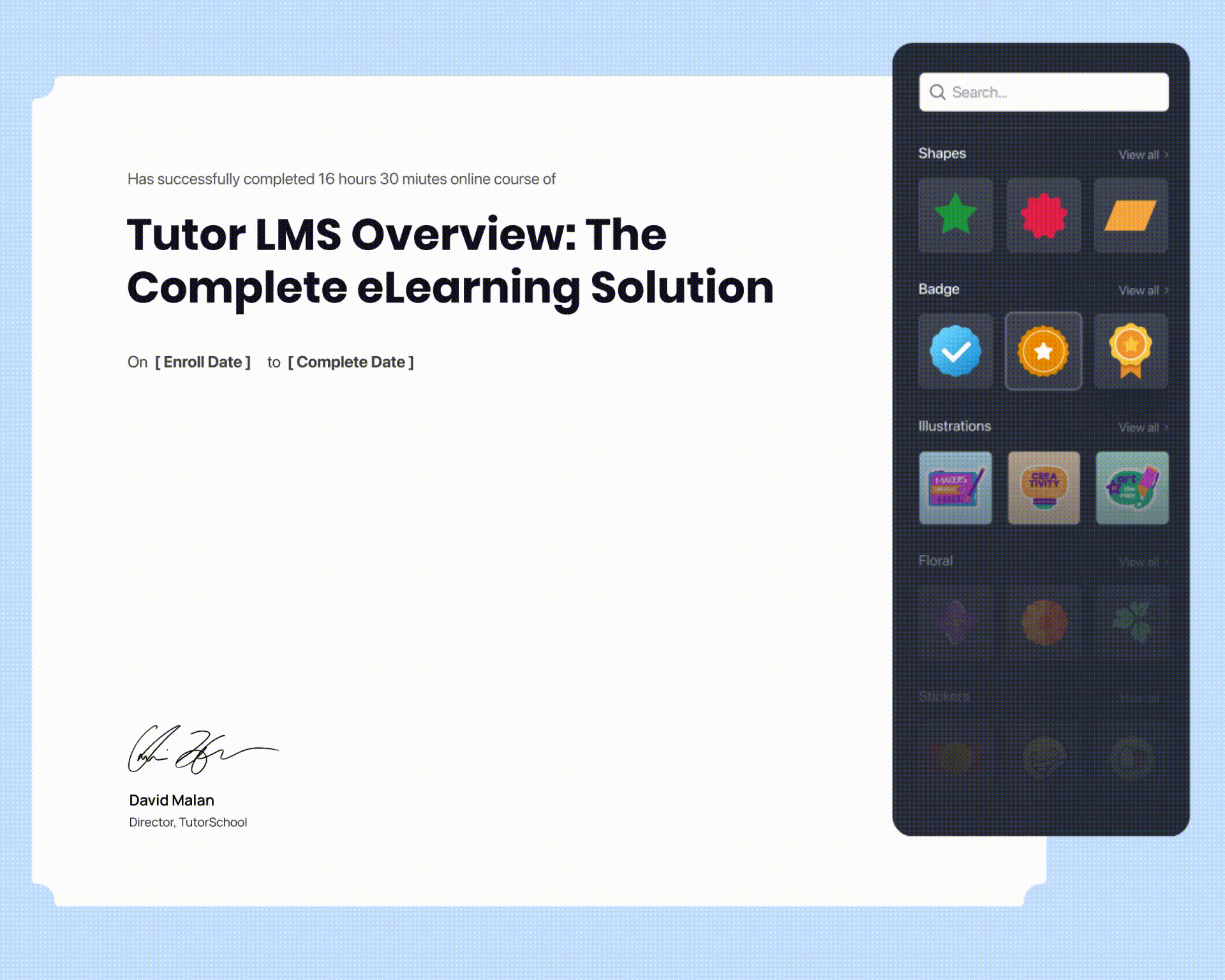Must-have Features That Make Your eLearning Platform Stand Out From the Crowd

From old chalkboards to interactive whiteboards or iPads, we have come a long way. As our education system has revolutionized, online learning is no surprise nowadays.
A report shows that the global online learning market is expected to reach about $457.8 Billion at the end of 2026! By the way, it was forecasted even before the COVID-19 outbreak, when the virtual education system was flourishing.
With technological advancements, people are getting more comfortable with online learning. So, if you are thinking about either updating the existing eLearning platform or building a new one, this might be the perfect time! Either way, this blog will help you to identify the must-have features of an eLearning platform to design a great learning platform.
Let’s start!
What Is an eLearning Platform
The very first step of starting anything is having a clear concept about that thing. As you are going to work with an eLearning platform, you must know what a great eLearning platform is.
Well, an eLearning platform is a virtual platform that provides all of the tools, resources, and information that a learner or trainer might need to enhance the educational learning experience.
List of the Must-Have Features of an eLearning Platform
Circling back to the eLearning features, let’s look at some of the top features of an eLearning platform to ensure a highly functional learning experience.
1. Intuitive and Sharper UI
First impressions matter a lot! As people’s attention span is narrowing down, you have even less time to impress new visitors. The researchers at Missouri University of Science and Technology found that it takes less than two-tenths of a second to form a first impression about a website. You must keep this attention span time in mind while designing a new LMS platform.
Why?
Well, the important reason might be offering a seamless learning experience. Whenever a visitor lands on your website, make sure every step is buttery smooth. It may include the registration procedure, course enrollment process, resource management, payment, etc. However, if you truly care about the user experience of your LMS platform, go for Tutor LMS.
Tutor LMS offers a pitch-perfect user interface to design a better eLearning platform. It supports drag-and-drop functionalities to design online courses with minimum effort. Besides, you may use a Tutor LMS compatible theme to create a stunning eLearning platform in no time.
A great UI doesn’t mean adding vibrant colors or sparkling animations. It’s sole purpose is to offer the best learning experience with the least distractions.
2. Reporting and Data Analytics
Designing an eLearning platform is not about streaming educational videos or reading learning materials. Besides that, you must track the learner’s journey throughout the whole course. By getting the report, students can understand both their strengths and weaknesses in a specific course.
By the way, proper reporting is not only beneficial for the learners but also helpful for the instructors too. It helps the instructor to understand how his course is performing. Thus he can stay updated about when and which course he needs to update. Overall, the in-depth data insights are helpful for everyone related to that eLearning platform.
3. Adding Gamification

Gamification isn’t a new technique at all. But, this buzzword gained overwhelming prominence in recent years. So, what is gamification actually?
Well, the gamification process is adding various game-playing elements to make the learning process quite challenging, competitive, and engaging. If you want to adopt this technique to your online course, you have to redesign the traditional courses by adding gaming elements to those.
Try to add some additional twists by offering reward points, badges, or something else after completing each game. It dramatically boosts students’ motivation to work harder in order to achieve higher ranks. By the way, you can add gamification to an eLearning website pretty easily if you design your website with Tutor LMS.
4. Proper Assessment Management
A proper assessment process is integral to both online and offline education. It helps track a student’s learning curve, plan future courses, determine a student’s performance, etc.
However, we aren’t talking about the traditional question-answering method here. As you know, different courses require different types of assessment. So, you must check how many assessments features your selected LMS offers before choosing that.
By the way, you will get lots of assessment methods if you decide to choose Tutor LMS. It supports different types of quizzes, which you can implement on your website for free! Here are the available quizzes:
- True/False
- Single choice questions
- Multiple choice questions
- Fill in the blanks
- Essay/open-ended answers
- Short descriptive answers
- Image matching
- Sentence matching
- Text rearranging, etc.
Check the Tutor LMS Quiz Builder to learn more about designing quizzes for your online platform.
5. Responsive Design
Making a website responsive while designing it is no more a question, it’s a requirement. Our current world is heavily dependent on portable screens like smartphones, tablets, etc. So, it’s pretty natural that the learners may try to access the learning materials using those devices.
That’s why you must design an extremely responsive website for learners. Thus the students can concentrate more on their learning materials without facing any technical difficulties because of their devices. Besides, it helps the learners to access the materials from any place at any time.
However, if you are still not convinced about making your website responsive, you should check this stat. A report by CNBC published that 72.6% of people are using only smartphones as their primary device to browse websites. So, ignoring the responsive design will lead you to lose almost three-quarters of potential customers.
So, if your eLearning website isn’t responsive, it’s high time to give it a second thought!
6. Ensure Website Security

Ensuring top-notch security might be the most challenging job for every website owner. In terms of the education sector, ensuring security becomes more important as it consists of learners’ performance reports, assessment results, personal information, payment information, etc.
Even a single vulnerability on your website might put this information at risk. In the worst-case scenario, hackers may get access to your website and wipe out all of your course content. If you don’t want to face anything like this, follow these security tips carefully:
- Use secure hosting for your website
- Implement a secure payment gateway
- Keep your SSL certificate up-to-date
- Make your website GDPR compliant
- Use strong and reliable passwords, etc.
From ransomware to malware attacks, there are lots of potential risks for an ideal eLearning website. But you must keep your site secure from all those security threats in order to offer the best learning experience to your students.
7. Add-on Availability
Designing an eLearning website isn’t a piece of cake. You’ll need lots of functionalities while building your website. It’s nearly impossible to get all of these features from a single software program. That’s why the LMS tools should support third-party add-ons. Well, you don’t need to worry about these add-ons if you choose the Tutor LMS WordPress plugin to build your LMS website.
Tutor LMS Pro has 25+ add-ons. All of these add-ons help to design a better eLearning website. Here is the list of available add-ons with Tutor LMS:
| Add-on Name | Usage of this add-on |
|---|---|
| BuddyPress* | It helps to build a community where the teachers and students can share their knowledge or discuss the course curriculum. |
| Calendar | The Calendar add-on helps the learners to see their learning journey in a calendar view. |
| Content Drip | Content Drip allows the trainers to release the lessons only after a student meets a specific condition. |
| Course Bundle | It helps to create and sell bundles of multiple courses, providing a comprehensive learning experience in a single package. |
| Enrollment | It helps the website admin to enroll a student manually on the LMS platform. |
| Google Classroom Integration | Integrating Google Classroom with Tutor LMS allows the students to access files or use Google Classroom features directly from the Tutor LMS plugin. |
| Gradebook | Gradebook shows the students’ assessment results from different quizzes or assignments. |
| Paid Memberships Pro* | This plugin helps to generate the maximum amount of revenue by selling membership plans for the courses. It eases the process of restricting content and managing member subscriptions with recurring payments. |
| Quiz Export / Import | Users can save a lot of time by importing or exporting quizzes. |
| Restrict Content Pro* | It’s also a membership management software that helps the website owner to create or manage the subscription packages from a unified dashboard. |
| Social Login | It lets the users register & login through social media networks like Facebook, Google, Twitter, etc. |
| Assignments | This add-on is used to assign different exercise tasks to the students after completing certain lessons. |
| Certificate | It is used to generate downloadable certificates after completing a course. |
| Course Attachments | It helps instructors to add unlimited attachment files to their courses. |
| Course Preview | Students can preview some of the course contents without enrolling in a course via this add-on. |
| Both teachers and students will be notified about various tutor events using the Email add-on. | |
| Multi Instructors | This add-on can be used to run a Tutor LMS course with more than one instructor. |
| Notifications | Unlike Email notifications, this add-on helps to send front-end push notifications for specific events. |
| Prerequisites | The instructors may use this powerful add-on to restrict contents till the prerequisite courses are completed. |
| Reports | The Reports add-on can generate students’ performance by using the Tutor report stats. |
| WPML* | It helps to grow a global audience by creating lessons, courses, or dashboards in multiple languages. |
| Weglot* | You can effortlessly translate and localize your eLearning website into multiple languages. |
| Zoom Integration | Instructors can connect Zoom with Tutor LMS to host live online classes from the course page. The enrolled students can join those live classes directly from their lesson page. |
| WooCommerce Subscriptions* | It is used to avail WooCommerce recurring payments revenue for your Tutor LMS course. |
The star-marked (*) add-ons require installing an additional plugin to be implemented with Tutor LMS. You can check the whole list from the Tutor LMS Addons page.
8. Learning and Certification Management

Managing the students’ learning process and certifications have lots of complexities. So, ensure that your selected plugin can handle the students’ learning process and generate the certificates with ease.
As a robust LMS plugin, the Tutor LMS Certificate Builder helps users to generate professional certificates for students. By the way, you have to enable the Certificate add-on to get the Certificate Builder option on your Tutor LMS menu.
9. Integration of Seamless Payment Gateway
The primary goal of a payment gateway is securing the financial transactions of an LMS platform. So, every LMS plugin must integrate a highly secure and trustable payment gateway for their financial transactions. It not only secures the customer’s sensitive information but also helps to build customers’ trust.
So, these are the must-have features of an eLearning platform. Well, you may offer lots of other features for your customers, but make sure that none of these features described above is missed on your selected LMS plugin.
Benefits of Using an LMS to Design Your eLearning Platform

With the rapid emergence of eLearning platforms, it becomes a tough task to manage everything single-handedly. But you can ease the whole course creation and management process by using a great LMS plugin like Tutor LMS. Well, we have listed a few benefits of using an LMS plugin to design your eLearning platform.
- Consistency – Unlike a physical trainer, the LMS plugins have consistency while delivering the course contents. It ensures that every learner gets the same message during the learning process.
- Saves time – There is no doubt that the LMS plugins save a lot of time for both instructors and learners. From the registration to enrolling and learning process, everything is automated on the LMS plugins. So, forget the manual paperwork, and focus more on learning!
- Data insights – Every decent LMS plugin like Tutor LMS offers in-depth student data. By utilizing those insights, instructors can analyze students’ progress on a specific course within minutes.
These are the top benefits of using an LMS plugin to design an eLearning platform. Use the best LMS plugin for your website and offer a smoother, faster, and hassle-free learning experience to the students.
To Sum Up
eLearning is growing rapidly across the world. It’s time to say goodbye to the ancient dull, and gloomy learning experience. Let’s adopt the latest eLearning methods and make the learning process acceptable to our new generation. We hope our list of the must-have features of an eLearning platform will help you to design a better learning platform for learners.
Have fun and keep learning!
Start Using Tutor LMS Today
Ready to take your online courses to new heights? Download Tutor LMS now and enjoy a journey of eLearning excellence.